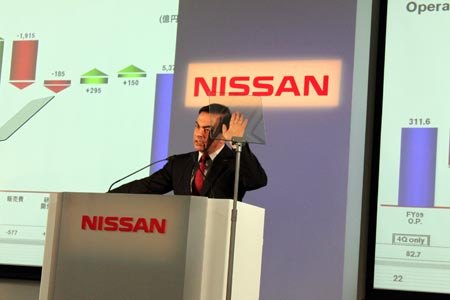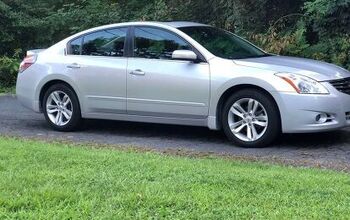Carlos Ghosn: The EV Will Set You Free (It's The Battery, Stupid)

Further on today’s results conference at Nissan, I could regale (or most likely bore) you with what you will hear from just about any Japanese carmaker, and possibly from non-Japanese carmakers as well: Last year was a good year, the March 11 tsunami makes this year a challenging year, but what will not kill us makes us stronger, and in ancient China, crisis and opportunity were one and the same.
Now this is Nissan and Carlos Ghosn who has bet a farm in France and one in Japan on the future of the electric car. Ghosn made a few points today that are well worth noting. He talked about nukes, CO2, blackouts – and batteries.
At the end of his prepared statements, Ghosn said:
“Thanks to the early success of the Nissan Leaf, Nissan has become the undisputed leader in sustainability, propelling the automotive industry to a future that no longer relies on a single, non-renewable resource.”
That was ignored by the press as the usual fluff and hyperbola. That is unfortunate, because there is a gem in it.
In the following Q&A, a reporter from the Nippon Hoso radio station unwittingly stumbled over the gemstone. He asked a question that is being asked many times these days: Will the nuclear power disaster in Japan (and the knee-jerk reaction the world over) dent and scratch the image of the EV? The radioman received a surprising answer from Carlos Ghosn:
“What is the specific advantage of electric cars? They don’t rely on one single commodity for their power. You can make electricity out of many sources, wind, solar, natural gas, oil, coal, hydroelectric. The beauty of the electric car is if you have a problem with oil, or you have a problem with nuclear, or you have a problem with coal, you just have to change the source of the electricity. We have transportation that is not depending on one single commodity. If there is a problem with nuclear, or a problem with oil, or a problem with coal, the superiority of the electric car is that it is not stuck. Because you can create electricity from so many sources, the electric car is really the car for the future.”
Of course that switching can’t be done overnight. But it can be done in a much shorter timeframe than, say, moving all cars from gasoline to hydrogen. Building new power plants takes a few years. Building a new infrastructure takes decades at best. Now what to do during the times of the switchover to alternate sources?
This being Japan, a reporter from the Asahi Shimbun put it in the appropriately courteous words: “When there is a blackout, charging may be difficult. This may be a concern that may rise.”
Carlos Ghosn waved his arms in his inimitable way (it used startle the common Japanese, who are keeping their hands to their side, but in the meantime, they warmed up to it), and he answered:
“It is true if you have a blackout and you want to charge your car, you can’t. But the beauty of the electric car is that you can charge your car whenever you want. In the contrary, if you have a blackout, you can now use your car to light your house. The non-reliability of electricity made the battery a very important element. Now the battery becomes a place where you can store energy. So if you have a blackout, you can use a battery that is in your car.”
But then, if we shut down the nukes and go back to thermoelectric, won’t that create more CO2, asked the man from Asahi in a much more polite way than I can write. Ghosn’s answer:
”I don’t think that the last word has been spoken in terms of energy, In the next 10 or 20 years, we will see a lot of development in terms of energy. Less CO2 generation, more renewable energy is coming on stream. But one thing is common to all of these developments: We need to store energy. And the only way we can store energy is by developing the batteries. And here we are at the heart of the electrical car technical challenge. And that is what we are pursuing. We don’t think that anything that will happen in terms of energy will stop or reduce the importance of the battery as a unique way to store energy, no matter where this energy is generated from.”
Nissan and Renault are building factories in the UK, the U.S, and Portugal which will be able to produce a total of 500,000 batteries per years by 2015. By that time, 8 new EVs will be launched between Renault and Nissan. 500,000 batteries mean half a million EVs. Who will buy them by 2015? For instance the people that already make up Nissan’s largest market, and that deny license plates to conventional powered cars is their nation’s capital. Said Ghosn:
“As a zero emission leader, the Alliance is already better placed than its competitors to compete both in mature and emerging markets such as China, where environmental and regulatory realities as well as consumer demand are expected to dramatically increase the market share of electric cars.”

Bertel Schmitt comes back to journalism after taking a 35 year break in advertising and marketing. He ran and owned advertising agencies in Duesseldorf, Germany, and New York City. Volkswagen A.G. was Bertel's most important corporate account. Schmitt's advertising and marketing career touched many corners of the industry with a special focus on automotive products and services. Since 2004, he lives in Japan and China with his wife <a href="http://www.tomokoandbertel.com"> Tomoko </a>. Bertel Schmitt is a founding board member of the <a href="http://www.offshoresuperseries.com"> Offshore Super Series </a>, an American offshore powerboat racing organization. He is co-owner of the racing team Typhoon.
More by Bertel Schmitt
Latest Car Reviews
Read moreLatest Product Reviews
Read moreRecent Comments
- ToolGuy First picture: I realize that opinions vary on the height of modern trucks, but that entry door on the building is 80 inches tall and hits just below the headlights. Does anyone really believe this is reasonable?Second picture: I do not believe that is a good parking spot to be able to access the bed storage. More specifically, how do you plan to unload topsoil with the truck parked like that? Maybe you kids are taller than me.
- ToolGuy The other day I attempted to check the engine oil in one of my old embarrassing vehicles and I guess the red shop towel I used wasn't genuine Snap-on (lots of counterfeits floating around) plus my driveway isn't completely level and long story short, the engine seized 3 minutes later.No more used cars for me, and nothing but dealer service from here on in (the journalists were right).
- Doughboy Wow, Merc knocks it out of the park with their naming convention… again. /s
- Doughboy I’ve seen car bras before, but never car beards. ZZ Top would be proud.
- Bkojote Allright, actual person who knows trucks here, the article gets it a bit wrong.First off, the Maverick is not at all comparable to a Tacoma just because they're both Hybrids. Or lemme be blunt, the butch-est non-hybrid Maverick Tremor is suitable for 2/10 difficulty trails, a Trailhunter is for about 5/10 or maybe 6/10, just about the upper end of any stock vehicle you're buying from the factory. Aside from a Sasquatch Bronco or Rubicon Jeep Wrangler you're looking at something you're towing back if you want more capability (or perhaps something you /wish/ you were towing back.)Now, where the real world difference should play out is on the trail, where a lot of low speed crawling usually saps efficiency, especially when loaded to the gills. Real world MPG from a 4Runner is about 12-13mpg, So if this loaded-with-overlander-catalog Trailhunter is still pulling in the 20's - or even 18-19, that's a massive improvement.










































Comments
Join the conversation
That's not Carlos Ghosn, that's Arturo Toscanini! Great pics, interesting quote. Maybe Carlos read my post on Monday...
I am confused... Barak Obama says EV's are good and everyone has a fit, Carlos says EV's are good and all of a sudden they might just be a good thing after all.